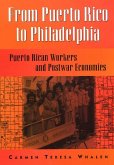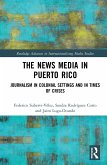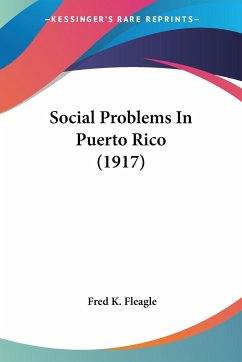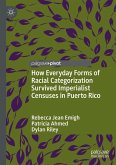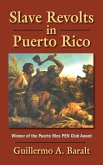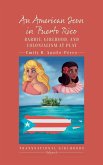Emotional Bridges to Puerto Rico is about Puerto Ricans' struggles of incorporation into U.S. society, and the conditions under which members of the Puerto Rican middle-class move back and forth between the mainland and island. The book illustrates how structures of inequalities based on race, class, and gender affect Puerto Ricans' subjective assessments of incorporation. Issues regarding the racialization of Puerto Ricans in the U.S. reveal that in spite of structural incorporation, Puerto Ricans do not feel like they fully belong in mainland society. These experiences carry implications for future migration and settlement decisions.
Hinweis: Dieser Artikel kann nur an eine deutsche Lieferadresse ausgeliefert werden.
Hinweis: Dieser Artikel kann nur an eine deutsche Lieferadresse ausgeliefert werden.
Elizabeth Aranda provides an original, sensitive, and insightful analysis of the subjective experience of transnational migration. Based on in-depth interviews with middle-class Puerto Ricans in the United States and Puerto Rico, her work documents how emotions shape the daily lives of people who move abroad, resettle, incorporate, and often move again. I am extremely impressed by Aranda?s wealth of data, rich interpretations, innovative theoretical framework, tight arguments, and broad sociological imagination... -- Jorge Duany, author of The Puerto Rican Nation on the Move: Identities on the Island and in the United States Migrants' feelings are the heart and soul of the migration process, but most contemporary studies of international migration have neglected this very elemental, human aspect. Elizabeth Aranda's book provides an important remedy, showing us how migrants' emotions about loss and belonging, home,and family members plays an important role in the migration process. This book provides many insights for anyone seeking to understand the role of emotions in migration. -- Pierrette Hondagneu-Sotelo, University of Southern California In this important book Elizabeth Aranda shows that Puerto Ricans, despite being US citizens, experience a second class status in the USA. To make her point, rather than relying exclusively on traditional socioeconomic indicators of sucess or failure,Aranda examines their degree of emotional enbeddedness, that is, she examines how Puerto Ricans feel in the USA, how do they perceive they are treated by Americans. Her focus on subjectivity and emotions alone is a welcome addition to the literature ofmigration and assimilation and should lead others to follow in her footsteps. This is a must read book for anyone interested in migration, immigration, assimilation, and race and ethnicity studies. -- Eduardo Bonilla-Silva, Duke University Often referred to as a commuter nation, Puerto Ricans are one of the earliest examples of the transnational lives that most migrants are leading today, as they repeatedly displace themselves between their homeland and the United States. By weaving together the stories and subjective experiences of middle-class Puerto Rican migrants, Aranda focuses on a neglected dimension of Puerto Rican migration research making an important contribution to the literature. She provides an invaluable analysis of selective forms of migrant adaptation and incorporation to US society, challenges traditional and now inadequate assimilation paradigms, and offers insightful interpretations that are more in tune with the globalization processes and realities that are shaping contemporary migration. The author ably captures the changing and paradoxical realities of Puerto Rican migration-from the continuous growth and geographic dispersion, to the more socioeconomically diversified population of today. The result is a compelling portrait of a people intent on preserving their sense of Puerto Ricanness while also functioning as productive and engaged citizens within US society; wrestling with their emotional attachments to the island and the socioeconomic prosperity they hop -- Edna Acosta-Belen, University at Albany, SUNY ...insightful monograph... Centro: Journal Of The Center For Puerto Rican Studies In a fresh and probing analysis, Aranda presses beyond male-centric immigration approaches to accent critical dimensions of family, gender, and emotion. Forty vital interviews with middle-class Puerto Ricans underscore the centrality of cross-border human communities in contemporary immigration, as well as of family concerns in migration decisions. Family considerations constantly vie with economic goals for many contemporary immigrants. -- Joe R. Feagin, Ella C. McFadden Professor of Liberal Arts, Texas A & M University and author of The First: How Children Learn Race and Racism ( Elizabeth Aranda provides an original, sensitive, and insightful analysis of the subjective experience of transnational migration. Based on in-depth interviews with middle-class Puerto Ricans in the United States and Puerto Rico, her work documents how emotions shape the daily lives of people who move abroad, resettle, incorporate, and often move again. I am extremely impressed by Aranda's wealth of data, rich interpretations, innovative theoretical framework, tight arguments, and broad sociological imagination. -- Jorge Duany, author of The Puerto Rican Nation on the Move: Identities on the Island and in the United States In this important book Elizabeth Aranda shows that Puerto Ricans, despite being US citizens, experience a second class status in the USA. To make her point, rather than relying exclusively on traditional socioeconomic indicators of "sucess" or "failure," Aranda examines their degree of "emotional enbeddedness," that is, she examines how Puerto Ricans feel in the USA, how do they perceive they are treated by Americans. Her focus on subjectivity and emotions alone is a welcome addition to the literature of migration and assimilation and should lead others to follow in her footsteps. This is a must read book for anyone interested in migration, immigration, assimilation, and race and ethnicity studies. -- Eduardo Bonilla-Silva, Duke University Often referred to as a "commuter nation," Puerto Ricans are one of the earliest examples of the transnational lives that most migrants are leading today, as they repeatedly displace themselves between their homeland and the United States. By weaving together the stories and subjective experiences of middle-class Puerto Rican migrants, Aranda focuses on a neglected dimension of Puerto Rican migration research making an important contribution to the literature. She provides an invaluable analysis of selective forms of migrant adaptation and incorporation to US society, challenges traditional and now inadequate assimilation paradigms, and offers insightful interpretations that are more in tune with the globalization processes and realities that are shaping contemporary migration. The author ably captures the changing and paradoxical realities of Puerto Rican migration-from the continuous growth and geographic dispersion, to the more socioeconomically diversified population of today. The result is a compelling portrait of a people intent on preserving their sense of Puerto Ricanness while also functioning as productive and engaged citizens within US society; wrestling with their emotional attachments to the island and the socioeconomic prosperity they hope to find in the United States; and capable of navigating and straddling different cultural and social spaces. -- Edna Acosta-Belen, University at Albany, SUNY



